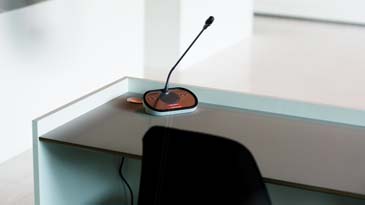About giving evidence in court
If you are called as a witness in court, you will receive a witness summons. If you are unsure what will happen during the court proceedings, you may talk to your legal advocate, your contact person or the prosecutor who is handling the case before the court hearing. This also applies if appearing in court as a witness is likely to cause you particular distress. Read more about your options for special consideration to be taken when you appear in court as a witness.
Your testimony as a witness has great importance to the case. Therefore, it is important that you show up at the court hearing and relate what happened. Even though you have been interviewed by the police, you can be called as a witness in court. Neither the judge, the defence council nor the prosecutor have been present at that time, therefore its important that you also give your statement to the court.
I court you can be referred to as a witness, even though the police have referred to you as a victim.
If you do not show up at the court hearing
You are required to attend. This applies even if you think your information is unimportant, or if you have previously given evidence about the case to the police or in court.
Some courts have introduced access checks. This means that when you arrive at the courthouse, you will be searched, and your belongings, such as bags, etc., will also be inspected.
If you fail to appear at the court hearing, or if you are denied access to the courthouse because you refuse to be searched or have your belongings inspected, you may be ordered to pay a fixed penalty. You also risk being picked up by the police and potentially placed in detention until you can be questioned in court.
You may only stay away if you have a lawful excuse (a valid excuse not to appear at the designated time). You may be asked to provide documentation.
A valid excuse can be illness, for example. Being busy or having courses, business meetings, etc., are not valid excuses for not appearing, but a trip abroad booked before you received the witness summons is normally deemed a valid excuse.
If you have a valid excuse for not appearing, you must contact the court or the person who issued you the court summons as soon as possible. The court will decide if you have a valid excuse for not testifying in court. Read more about illness and other reasons for not appearing in court.
Before the court hearing
Before you give evidence, you should go over what happened in your mind. If you made notes, you should read through them. You should also read any letters, documents, etc., of relevance to the case before the court hearing. You may need to speak to family or friends about your experience, but you should be careful about speaking to others about the details as this may affect your memory what happened.
If you have repeatedly told others what happened, you risk beginning to feel certain about some details about which you were previously uncertain.
If other witnesses tell you about their observations, this may also affect your memory of what happened.
In time, you may find that you have a hard time distinguishing between your own observations and what you have heard from others.
Even though some details may seem less important to you, they may have great bearing on the case. You should therefore try to keep a clear hold on the details you remember by not discussing them with others – particularly other witnesses in the case.
Where will the proceedings take place?
Your witness summons will state where the proceedings are to take place. It is a good idea to arrive at the courthouse well in advance so you have time to find the right courtroom. If you have a legal advocate, it may also be a good idea to agree to meet at a time earlier than that stated in the summons. Read more about legal advocates.
A daily court list is posted in the courthouse building. The court list states the courtroom in which the proceedings will take place, who is the defendant in the case, and the time when the proceedings are to start. In some courthouses, the daily court list will be displayed on a screen. There will be signs showing you how to find the courtroom. A daily court list is also displayed by the door of the courtroom so you can make sure you are in the right place.
The door is closed
When you arrive at the courtroom, the door will often be closed. This is because the proceedings are already underway. You must wait outside the courtroom. The prosecutor or the defence counsel will come and get you when it is your turn to give evidence. Some courthouses have special waiting rooms for you to wait in.
The witness summons will state a specific time for you to show up, but sometimes the proceedings are delayed so you may have to wait a while before you can go in.
Inside the courtroom
When you give evidence, you will sit in the centre of the courtroom in front of the judge and the lay judges. The defendant and his or her defence counsel will usually sit on your left, and the prosecutor will sit on your right. Any spectators present will be sitting behind you.
The judge will start out by asking your name to make sure the court knows who you are.
The judge will tell you who is the prosecutor and who is the defence counsel. Then you will be told that you have a duty to give evidence and that you must speak the truth and only say what you personally remember.
The judge will also tell you that it is a criminal offence to give false evidence in court. This does not mean the judge thinks you are going to lie. It simply means the judge has a duty to provide guidance and will say this to all witnesses giving evidence in court.

The examination will be conducted in a formal yet absolutely friendly tone. You are not expected to be able to give your entire testimony on your own. You will be asked questions. The prosecutor will normally examine you first, and then the defence counsel will ask you questions.
The purpose of a witness testimony is to shed light on actual circumstances. This means you should not offer your own opinion about what happened. You should explain what happened and answer the questions asked. You should only say what you personally remember. Information that you have from others or that someone has guessed cannot be used in trial proceedings.
Sometimes what a witness says in court differs from what the police recorded in a police report from their interview with the witness. When this happens, the witness will be asked which statement is correct.
When you have finished giving evidence, you can choose to go, but you can also stay and listen to the other witness testimonies and hear when the court delivers its judgment. If you want to stay, you should sit in the spectators' seats.
It can be difficult to say in advance how long it will take to examine you, as this depends greatly on the case in which you have been called as a witness.


